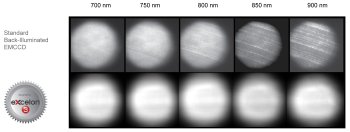Princeton Instruments (Trenton, New Jersey, USA) is pleased to introduce the next generation of eXcelon™ technology for EMCCDs. This new ‘eXcelon3’ technology provides ultimate EMCCD performance in terms of both sensitivity and improved fringe suppression.

In 2010, Princeton Instruments introduced advanced eXcelon CCD and EMCCD technology, which radically improved the sensitivity of back-illuminated detectors across a wide spectrum, from 200 nm to 1100 nm. It also significantly reduced etaloning, the problematic appearance of fringes attributable to constructive and destructive interference in a device’s back-thinned silicon while imaging in the NIR region (750 to 1100 nm).
Princeton Instruments is now ready to offer the next generation of eXcelon, which has been specifically developed to enhance the performance of EMCCDs. The company’s vice president of sales and marketing, Ravi Guntupalli, notes that “eXcelon3 is the exciting result of years of R&D by scientists at Princeton Instruments. Hundreds of eXcelon-based cameras are currently being used by researchers all over the world for demanding low-light applications. Third-generation eXcelon further solidifies this technology’s reputation as the gold standard for scientific-grade sensors with proven, measured performance.”
Although traditional back-illuminated EMCCDs are capable of single-photon sensitivity, they lack sufficient QE in the UV and NIR regions and suffer from etaloning (fringing) in the NIR region. New eXcelon3 greatly reduces both limitations, making these next-generation EMCCDs viable options for applications requiring broad UV-to-NIR sensitivity. For example, eXcelon3 detectors provide a peak QE of ~95% (at 650 nm) and 1.1x to 2.5x more sensitivity at specific wavelengths in the UV and NIR regions. In addition, they have been measured to reduce peak-to-peak fringe amplitude below 10%. The new sensors are also available with Princeton Instruments’ Unichrome UV coating to enhance sensitivity below 350 nm.
New eXcelon3 technology is available in Princeton Instruments’ ProEM+ series of deep-cooled EMCCD cameras, with 512 x 512 and 1024 x 1024 pixel formats and 1600 x 200 and 1600 x 400 for spectroscopy applications. These new eXcelon3-enabled cameras will target a wide variety of applications in both the life sciences and physical sciences, including Bose-Einstein condensate (BEC) imaging, astronomy, live-cell imaging, scanning confocal spectroscopy, single molecule spectroscopy, among others.